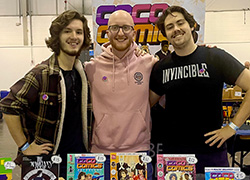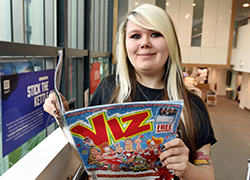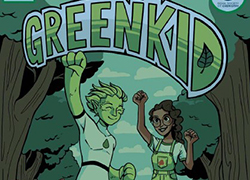Course overview
Foundation year Work placement
School of Arts & Creative Industries
See what it's like to study at our School of Arts & Creative Industries.
From manga, games and animation media to political satire, you are taught by professionals who make comics for Shockdom, Dennis Publishing and Viz Comic. Our career-focused modules help you understand your chosen field including how it works, how to access it, who shapes it and how to grow within it.
Each year you work towards annual showcases in the form of anthologies, booklets, exhibitions, comic conferences and industry events. We cover all aspects of the comic medium, from creating graphic novels to publishing. You develop your craft by responding creatively to live briefs and undertaking projects that contribute to your final portfolio. We support you to make your own distinctive choices, so that you develop your creative voice and your own unique creative identity as a contemporary storyteller, communicator and artist.
Top reasons to study this course at Teesside University:
- Nationally recognised:
- Comics and Graphic Novels is ranked 1st in the UK as part of our Graphic Design subject area ranking. (Guardian University Guide 2024, 2025 and 2026, tees.ac.uk/source)
- 90% of BA (Hons) Comics and Graphic Novels students go on to work and/or study 15 months after the course (Graduate Outcomes Survey 2020-21, tees.ac.uk/source).
- Industry-standard facilities: develop your own personal cartooning style using the latest technology including iMacs and Wacom digital drawing tablets.
- Get creative: our course and campus are powered by Adobe and Apple. We’re Europe’s first Adobe Creative Campus and the only Apple-accredited University, equipping you with the digital tools and resources to hone your creative skills.
- Professional membership: we’re a member of the Association of Illustrators, giving you access to interactive talks, guidance on contracts and licensing, and your own discounted membership. This gives you the tools you need to forge a successful career in industry or as a freelancer.
- Industry experience: work on live briefs for a variety of organisations such as Streetwise Opera and the NHS, helping you build your portfolio of work.
Creative UK
 Take advantage of our Creative UK membership and help futureproof your career, with networking events, a resource hub to support professional development, and bespoke workshops in partnership with industry leaders and mentors. Sign up for free student membership to get opportunities, events and newsletters sent directly to your inbox.
Take advantage of our Creative UK membership and help futureproof your career, with networking events, a resource hub to support professional development, and bespoke workshops in partnership with industry leaders and mentors. Sign up for free student membership to get opportunities, events and newsletters sent directly to your inbox.
Course details
Course structure
Year 1 core modules
Enhance your skills in team-working, communication, project management and negotiation. You collaborate with a group of your course mates to produce a small-scale creative project in response to a subject-specific brief.
This is a 20-credit module.
Study the fundamental drawing, design, communication and narrative skills you need to create a story in comic form. You consider the forms and methods of the medium, workshopping and experimenting to develop your understanding of their mechanisms. Also, you explore how current and past creators generated unique outcomes through their experiments with drawing. Discover the unique visual language of comic books, from its evolution to the effects of panel and page design, and also composition techniques and the effects of culture on design.
This is a 40-credit module.
Introduction to the Creative Industries
With many opportunities in the creative industries sector, learn how to start on your career path while developing vital employability skills such as networking and digital presence. Understand the structure of the sector and the interdisciplinary relationships between art, design and media. Discover how the sector operates locally, nationally and globally – debating the role of policy and the importance of sustainability.
This is a 20-credit module.
Narrating through comics provides you with the opportunity to learn approaches to the creative development of a plot. Explore the structural dimensions of your work through professional techniques such as three act plotting, character arcs and story sequencing.
This is a 40-credit module.
Year 2 core modules
Create an original self-directed project in collaboration with your course mates. You work together to secure a space - for example a local gallery, commercial space or community centre - to exhibit new work. Alternatively, you create, fund, design and publish an anthology of new professional work. Developing your portfolio of professional networks and skills, you enhance your ability to project manage, group work, promote, network and give presentations.
This is a 40-credit module.
Develop critical thinking and analysis skills, exploring contemporary issues and debates related to the creative industries. You research a specific area or development within your chosen subject – this may be technical, economic, ethical, legal, cultural, sociological, or a combination. You draw on appropriate academic and industry sources to contextualise your research. You present your topic and initial research within taught sessions, providing an opportunity for peer and tutor feedback.
This is a 20-credit module.
You develop and explore, in depth, a creative industry-based project in your specialist area of design, art, media, music, photography or illustration - relevant to your future professional practice. While forming a professional portfolio of work, you experience real-world business scenarios and challenges, industry competitions and cross and inter-disciplinary activities. You gain skills in project management, applied research methods and collaborative creative work.
This is a 40-credit module.
Working in the Creative Industries
There are many challenges facing contemporary art, design and media practices. You research the social, political or ecological challenges around us to generate a small-scale project. You develop and reflect on your understanding of enterprise in the context of the creative industries. Contextualise your own professional practice and aspirations through application of critical thinking and problem-solving skills.
This is a 20-credit module.
Optional work placement year
You have the option to spend one year in industry learning and developing your skills. We encourage and support you with applying for a placement, job hunting and networking.
You gain experience favoured by graduate recruiters and develop your technical skillset. You also obtain the transferable skills required in any professional environment, including communication, negotiation, teamwork, leadership, organisation, confidence, self-reliance, problem-solving, being able to work under pressure, and commercial awareness.
Many employers view a placement as a year-long interview, therefore placements are increasingly becoming an essential part of an organisation's pre-selection strategy in their graduate recruitment process. Benefits include:
· improved job prospects
· enhanced employment skills and improved career progression opportunities
· a higher starting salary than your full-time counterparts
· a better degree classification
· a richer CV
· a year's salary before completing your degree
· experience of workplace culture
· the opportunity to design and base your final-year project within a working environment.
If you are unable to secure a work placement with an employer, then you simply continue on a course without the work placement.
Final-year core modules
You produce a self-managed, individual extended piece of independent investigation and/or creative production or portfolio of work. Supervised by an academic member of staff, you take responsibility for the planning and execution of the work, including the consideration of associated legal, social, ethical and professional issues. You explore in depth a chosen subject area, demonstrating your ability to analyse, synthesise and creatively apply your learning, showing critical and evaluative skills and professional awareness.
This is a 60-credit module.
Plan and implement your departure from education to your first or new career, or to further study. You continue your creative practice, developing a portfolio and/or extended piece of work which reflects you as a creative. You explore discipline-specific employability strategies, and engage and network with industry to develop key connections.
This is a 60-credit module.
Modules offered may vary.
How you learn
Think, dream and make: learn through doing, with focused studio time for practice-based creative work, allowing you to develop ideas and undertake larger-scale, more ambitious projects.
Develop your creative voice: you are coached to find and grow your creative voice. Collaboration with industry professionals and your peers gives you new perspectives on developing your practice.
Grow resilience: develop a creative journal, capturing your challenges, milestones and reflections to see patterns in your thinking and linking reoccurring ideas. You learn how to test ideas, explore creative directions, understand pitching etiquette and develop large-scale projects to help you thrive in the creative industries.
Join the creative sector: our intensive, career-focused modules help you understand working in the arts and creative industries. From industry leaders’ professional wisdom and insight to accessing professional opportunities and creative coaching, you become an industry insider and leave with a working understanding of the professional community.
Become connected: access our network of alumni and practising creatives at Middlesbrough Institute of Modern Art (MIMA). Benefit from supportive voices, specialist expertise, shared wisdom and new ideas, establishing critical relationships that propel you into your creative career.
Get creative: take part in MIMA Creative Week, a festival of workshops where you experiment with new materials, go on field trips and upgrade your tech skills.
Expand your horizons: collaborate with our international partners in Dubai and India becoming international creative citizens while developing an understanding of wider global contexts, sustainability and the changing shape of equality and diversity.
Our Disability Services team provide an inclusive and empowering learning environment and have specialist staff to support disabled students access any additional tailored resources needed. If you have a specific learning difficulty, mental health condition, autism, sensory impairment, chronic health condition or any other disability please contact a Disability Services as early as possible.
Find out more about our disability services
Find out more about financial support
Find out more about our course related costs
Entry requirements
Entry requirements
Year 1 entry
96-112 points, including a creative subject, from any combination of recognised Level 3 qualifications and a creative portfolio showing skills in your chosen discipline. Digital portfolios are accepted but you are given the opportunity to attend a session on campus to discuss your portfolios with our staff. Consideration is also given to students without formal qualifications but with evidence of practical subject experience at an appropriate level.
Applicants are invited join us on campus for an applicant day, enabling you to see our comics and graphic novels facilities, to have your portfolio reviewed by a member of the comics and graphic novels team, meet staff and students and learn more about studying at Teesside University.
Non-EU international students who need a student visa to study in the UK should check our web pages on UKVI-compliant English language requirements. The University also provides pre-sessional English language courses to help you meet the English language requirements.
Helping you meet the entry requirements
We may be able to help you meet the requirements for admission by offering you the opportunity to study one or more Summer University modules, some of which can be studied by distance learning.
Alternative degree with integrated foundation year
If you are unable to achieve the minimum admission requirements for Year 1 entry you could, subject to eligibility, join one of our degree courses with an integrated foundation year.
Direct entry to later years
If you have previously studied at higher education level (for example, a foundation degree, HNC, HND or one or more years at degree level at another institution) you may request direct entry to Year 2 or year 3 of this degree.
Mature applicants
We welcome applications from mature students (aged over 21) who can demonstrate, through portfolio/written work and relevant experience, that they have developed cognitive and technical skills through their life experiences.
For general information please see our overview of entry requirements.
International applicants can find out what qualifications they need by visiting Your Country.
You can gain considerable knowledge from work, volunteering and life. Under recognition of prior learning (RPL) you may be awarded credit for this which can be credited towards the course you want to study.
Find out more about RPL
Employability
Career opportunities
The course draws on existing and new relationships in targeted sectors to offer live briefs for:
- film and TV - Vertigo Films, Double Negative, BBC, Channel 4
- games - 22 Cans, Electronic Arts, Ubisoft
- advertising - Drummond Central, Cravens Advertising, Guerrilla, Sumo Digital
- comics - Viz Comics, Rebellion Publishing, Journalism, Guardian, Telegraph, Independent
Expected career routes include self-publishing, graphic novel publishing, advertising, marketing, public relations, journalism, editing, publishing and graphic design.
You are expected to do at least one two-week work placement between your second and third years, though opportunities will be available for significantly more workplace experiences through our placement officer.
Information for international applicants
Qualifications
International applicants - find out what qualifications you need by selecting your country below.
Select your country:
Useful information
Visit our international pages for useful information for non-UK students and applicants.













 BA (Hons) Comics and Graphic Novels
BA (Hons) Comics and Graphic Novels BA (Hons) Comics and Graphic Novels
BA (Hons) Comics and Graphic Novels BA (Hons) Comics and Graphic Novels
BA (Hons) Comics and Graphic Novels Start-up business celebrating comics creators at convention
Start-up business celebrating comics creators at convention Talented student makes her mark in national comic
Talented student makes her mark in national comic Comic created to encourage interest in science among children
Comic created to encourage interest in science among children